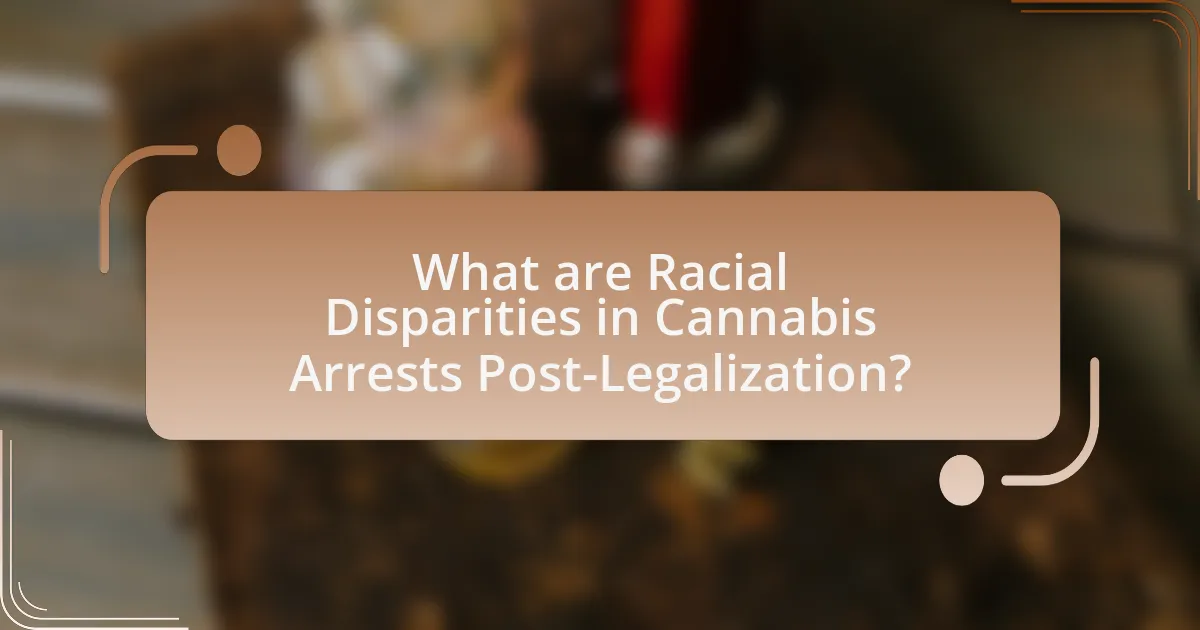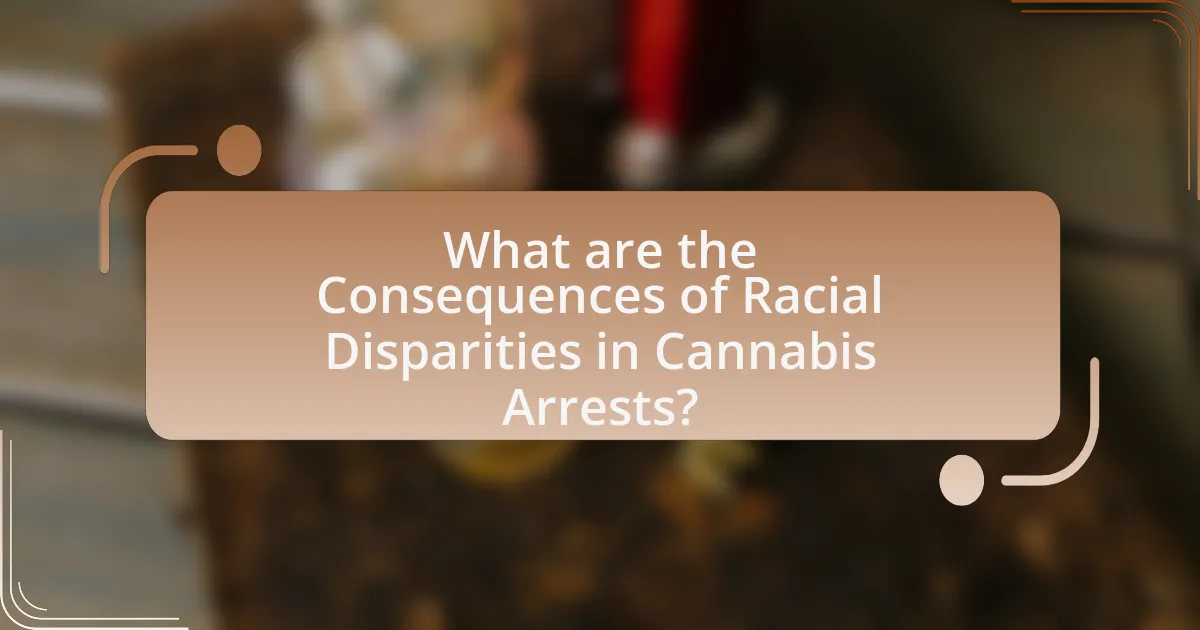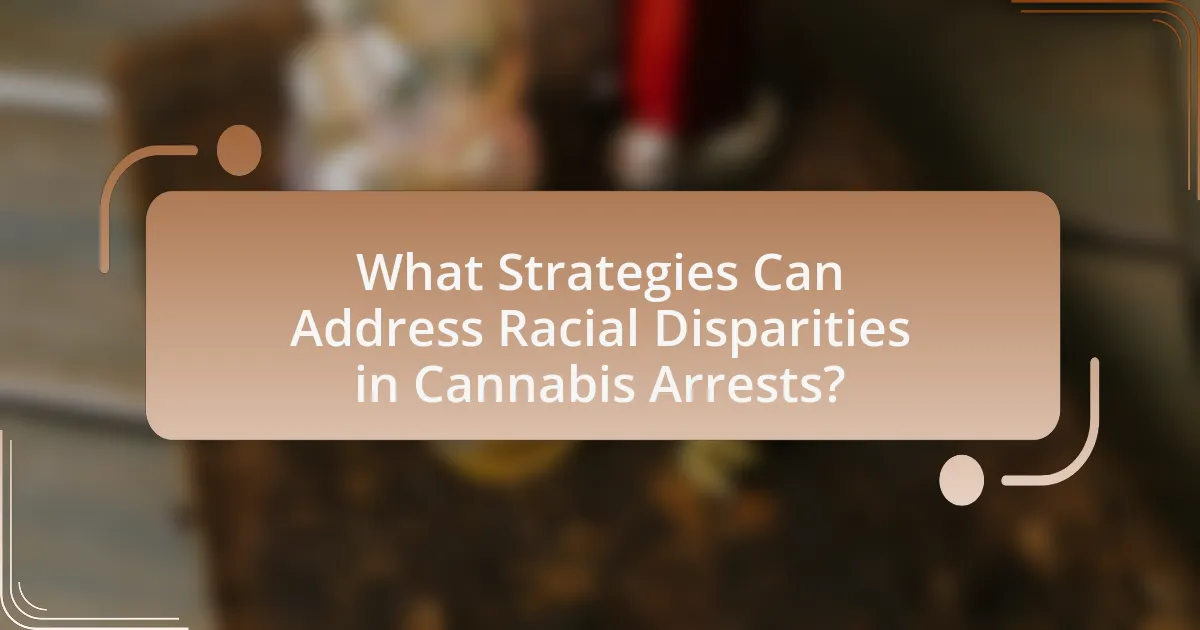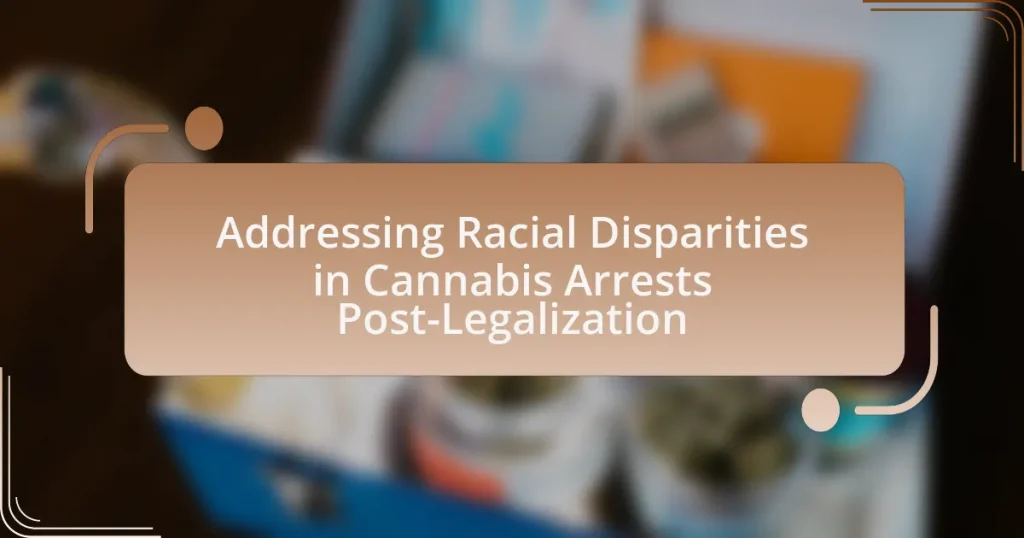The article addresses racial disparities in cannabis arrests following legalization, highlighting that Black individuals continue to be arrested at disproportionately higher rates than white individuals, even in states where cannabis is legal. Key findings from the American Civil Liberties Union indicate that Black people are 3.64 times more likely to be arrested for cannabis-related offenses compared to their white counterparts. The article explores the impact of cannabis legalization laws on arrest rates, the role of systemic biases and law enforcement practices, and the socio-economic factors contributing to these disparities. It also discusses the long-term consequences for affected communities, the need for policy reforms, and strategies to mitigate these inequities through decriminalization, expungement, and community engagement initiatives.

What are Racial Disparities in Cannabis Arrests Post-Legalization?
Racial disparities in cannabis arrests post-legalization persist, with studies indicating that Black individuals are still arrested at disproportionately higher rates compared to white individuals. For example, a report from the American Civil Liberties Union (ACLU) found that in states where cannabis was legalized, Black people were still 3.64 times more likely to be arrested for cannabis-related offenses than white people. This trend highlights systemic issues within law enforcement practices and the ongoing impact of historical racial biases, despite the legal status change of cannabis in various jurisdictions.
How have cannabis legalization laws impacted arrest rates among different racial groups?
Cannabis legalization laws have significantly reduced arrest rates among all racial groups, but disparities persist. For instance, a study by the American Civil Liberties Union (ACLU) found that while overall cannabis arrests decreased by about 80% in states that legalized cannabis, Black individuals were still 3.64 times more likely to be arrested for cannabis-related offenses than white individuals in those states. This indicates that despite legalization, racial disparities in arrest rates continue to exist, highlighting the need for ongoing reforms to address these inequities.
What statistics illustrate the racial disparities in cannabis arrests before and after legalization?
Statistics indicate that racial disparities in cannabis arrests persist despite legalization. For instance, a 2020 report from the American Civil Liberties Union (ACLU) revealed that Black individuals are 3.64 times more likely to be arrested for cannabis possession than white individuals, even in states where cannabis is legal. Additionally, a study in California showed that while overall cannabis arrests decreased by 56% after legalization in 2016, Black individuals still represented 28% of those arrested for cannabis-related offenses, despite making up only 6% of the state’s population. These statistics highlight that racial disparities in cannabis arrests remain significant before and after legalization.
How do these disparities vary by state or region?
Disparities in cannabis arrests vary significantly by state and region, reflecting differences in legislation, enforcement practices, and demographic factors. For instance, states like Colorado and Washington, which have legalized recreational cannabis, show a decrease in racial disparities in arrests compared to states like Alabama and Louisiana, where enforcement remains stringent and disproportionately affects minority communities. Data from the American Civil Liberties Union indicates that Black individuals are 3.64 times more likely to be arrested for cannabis possession than white individuals in states with strict enforcement, while this ratio decreases in states with more progressive cannabis laws. This illustrates how regional policies and law enforcement practices directly influence racial disparities in cannabis-related arrests.
Why do racial disparities persist in cannabis arrests despite legalization?
Racial disparities persist in cannabis arrests despite legalization primarily due to systemic biases and enforcement practices that continue to target minority communities. Studies indicate that even in states where cannabis is legalized, Black individuals are arrested at disproportionately higher rates compared to their white counterparts. For instance, a report from the American Civil Liberties Union (ACLU) found that Black people are 3.64 times more likely to be arrested for cannabis possession than white people, even in states with legalized cannabis. This ongoing disparity is influenced by factors such as implicit bias among law enforcement, socioeconomic conditions, and the legacy of criminalization that disproportionately affected communities of color.
What role do law enforcement practices play in these disparities?
Law enforcement practices significantly contribute to racial disparities in cannabis arrests post-legalization. Despite legalization, data shows that Black individuals are still arrested at disproportionately higher rates compared to their white counterparts. For instance, a study by the American Civil Liberties Union (ACLU) found that Black people are 3.64 times more likely to be arrested for cannabis possession than white people, even in states where cannabis is legal. This indicates that law enforcement practices, such as targeted policing and racial profiling, continue to perpetuate these disparities, undermining the intended equity of legalization efforts.
How do socio-economic factors contribute to ongoing racial disparities?
Socio-economic factors significantly contribute to ongoing racial disparities by influencing access to resources, opportunities, and systemic advantages. For instance, individuals from marginalized racial groups often experience lower income levels, limited educational opportunities, and higher unemployment rates, which perpetuate cycles of poverty and restrict upward mobility. According to the U.S. Census Bureau, in 2020, the median household income for Black families was approximately $45,870, compared to $74,580 for White families, highlighting economic inequality. This economic disadvantage can lead to increased interactions with law enforcement, particularly in contexts like cannabis arrests, where racial minorities are disproportionately targeted despite similar usage rates across racial groups. A study by the American Civil Liberties Union found that Black individuals are 3.64 times more likely to be arrested for marijuana possession than White individuals, underscoring how socio-economic status intersects with race to create systemic disparities in legal outcomes.

What are the Consequences of Racial Disparities in Cannabis Arrests?
Racial disparities in cannabis arrests lead to significant social, economic, and legal consequences for affected communities. These disparities contribute to systemic inequality, as individuals from marginalized racial groups face higher arrest rates despite similar usage rates compared to their white counterparts. For instance, a 2020 report from the American Civil Liberties Union (ACLU) revealed that Black individuals are 3.64 times more likely to be arrested for cannabis possession than white individuals, perpetuating cycles of poverty and disenfranchisement.
Additionally, these arrests often result in long-term consequences, such as criminal records that hinder employment opportunities, access to housing, and eligibility for educational programs. The stigma associated with a criminal record disproportionately affects communities of color, exacerbating existing socioeconomic disparities. Furthermore, racial disparities in cannabis arrests can lead to mistrust between law enforcement and communities, undermining public safety and community cohesion.
How do these disparities affect communities of color?
Disparities in cannabis arrests significantly affect communities of color by perpetuating systemic inequalities and hindering socioeconomic advancement. For instance, despite similar usage rates, Black individuals are arrested for cannabis-related offenses at rates disproportionately higher than their white counterparts, with a 2020 ACLU report indicating that Black people are 3.64 times more likely to be arrested for cannabis possession than white individuals. This over-policing leads to criminal records that can obstruct access to employment, housing, and education, further entrenching poverty and limiting opportunities for upward mobility within these communities. Additionally, the stigma associated with criminal records exacerbates social marginalization, creating barriers to community cohesion and trust in law enforcement.
What are the long-term social and economic impacts of cannabis arrests on affected communities?
Long-term social and economic impacts of cannabis arrests on affected communities include increased poverty rates, diminished economic opportunities, and heightened social stigma. Communities with high rates of cannabis arrests often experience a cycle of disadvantage, where individuals face barriers to employment and housing due to criminal records. For instance, a study by the American Civil Liberties Union (ACLU) found that Black individuals are 3.64 times more likely to be arrested for cannabis possession than white individuals, contributing to systemic inequalities. Additionally, the loss of potential tax revenue from cannabis legalization in these communities can hinder local economic development, as seen in states where legalization has not been equitably implemented. These factors collectively perpetuate a cycle of disadvantage, impacting community cohesion and overall quality of life.
How do these disparities influence public perception and trust in law enforcement?
Disparities in cannabis arrests significantly undermine public perception and trust in law enforcement. When certain racial or ethnic groups are disproportionately targeted for cannabis-related offenses, it fosters a sense of injustice and alienation among those communities. For instance, a report from the American Civil Liberties Union (ACLU) found that Black individuals are nearly four times more likely to be arrested for cannabis possession than white individuals, despite similar usage rates. This statistical evidence highlights systemic bias, leading to diminished trust in law enforcement as communities perceive policing practices as discriminatory. Consequently, these disparities create a barrier to effective community-police relations, as marginalized groups may view law enforcement as an oppressive force rather than a protective entity.
What legal and policy implications arise from racial disparities in cannabis arrests?
Racial disparities in cannabis arrests lead to significant legal and policy implications, including the need for criminal justice reform and the reevaluation of drug policies. These disparities often result in disproportionate targeting of minority communities, which can perpetuate systemic inequality and undermine public trust in law enforcement. For instance, a 2020 report from the American Civil Liberties Union revealed that Black individuals are 3.64 times more likely to be arrested for cannabis possession than white individuals, despite similar usage rates. This data highlights the necessity for policymakers to address these inequities through measures such as decriminalization, expungement of past convictions, and the implementation of equitable enforcement practices. Additionally, the disparities can influence legislative priorities, prompting calls for comprehensive approaches that include social equity programs aimed at supporting affected communities in the cannabis industry.
How can these disparities affect future cannabis legislation and reform efforts?
Disparities in cannabis arrests can significantly influence future cannabis legislation and reform efforts by highlighting the need for equitable policies. These disparities, particularly those affecting marginalized communities, can lead to public outcry and demand for reforms that address social justice issues. For instance, a report from the American Civil Liberties Union (ACLU) found that Black individuals are 3.64 times more likely to be arrested for cannabis possession than white individuals, despite similar usage rates. This data underscores the urgency for lawmakers to consider equity in their legislative frameworks, potentially leading to reforms that include expungement of records, equitable access to the cannabis market, and reinvestment in affected communities. As public awareness of these disparities grows, legislators may be compelled to implement more inclusive policies that rectify historical injustices and promote fairness in cannabis regulation.
What are the potential consequences for individuals with cannabis-related criminal records?
Individuals with cannabis-related criminal records may face significant consequences, including barriers to employment, housing, and access to education. These records can lead to discrimination in hiring practices, as many employers conduct background checks and may disqualify candidates with such records. Additionally, individuals may struggle to secure housing, as landlords often review criminal histories. Access to financial aid for education can also be impacted, as certain drug convictions can render individuals ineligible for federal student loans and grants. According to a report by the American Civil Liberties Union, the collateral consequences of drug convictions disproportionately affect marginalized communities, exacerbating existing racial disparities.

What Strategies Can Address Racial Disparities in Cannabis Arrests?
Implementing decriminalization and expungement policies can effectively address racial disparities in cannabis arrests. Decriminalization reduces the legal penalties associated with cannabis possession, which has been shown to decrease arrest rates, particularly among marginalized communities. For instance, states like California and Illinois have enacted laws that not only decriminalize cannabis but also provide pathways for expunging prior cannabis-related convictions, thereby alleviating the long-term impacts of these arrests on individuals’ lives. Research indicates that in states where cannabis has been legalized, there has been a significant reduction in racial disparities in arrest rates, highlighting the effectiveness of these strategies. Additionally, investing in community education and outreach programs can further mitigate disparities by ensuring that all communities are informed about their rights and the legal landscape surrounding cannabis use.
What policy changes are necessary to reduce racial disparities in cannabis arrests?
To reduce racial disparities in cannabis arrests, decriminalization of cannabis and the expungement of past convictions are essential policy changes. Decriminalization would eliminate criminal penalties for cannabis possession, thereby reducing the number of arrests, particularly among marginalized communities disproportionately affected by enforcement practices. Expungement policies would allow individuals with prior cannabis-related convictions to clear their records, mitigating the long-term impacts of these arrests on employment and housing opportunities. Evidence from states that have legalized cannabis shows a significant decrease in arrest rates, particularly among Black and Latino populations, highlighting the effectiveness of these policy changes in addressing systemic inequities.
How can decriminalization and expungement efforts help address these disparities?
Decriminalization and expungement efforts can significantly reduce racial disparities in cannabis arrests by eliminating criminal penalties for cannabis-related offenses and clearing the records of individuals previously convicted. These measures directly address the disproportionate impact of cannabis laws on marginalized communities, particularly people of color, who have historically faced higher arrest rates despite similar usage rates compared to white individuals. For instance, a report from the American Civil Liberties Union (ACLU) found that Black individuals are nearly four times more likely to be arrested for cannabis possession than white individuals, despite comparable usage rates. By decriminalizing cannabis, jurisdictions can prevent future arrests and reduce the collateral consequences associated with criminal records, such as barriers to employment, housing, and education. Expungement allows individuals to reintegrate into society without the stigma of a criminal record, thereby promoting equity and social justice in communities disproportionately affected by past enforcement practices.
What role do community programs play in mitigating the effects of past arrests?
Community programs play a crucial role in mitigating the effects of past arrests by providing support, resources, and opportunities for rehabilitation. These programs often focus on education, job training, and mental health services, which help individuals reintegrate into society and reduce recidivism rates. For instance, studies have shown that participation in community-based programs can lead to a 30% decrease in re-arrest rates among formerly incarcerated individuals. By addressing the underlying issues that contribute to criminal behavior, such as lack of employment and social support, community programs effectively assist in healing the long-term impacts of past arrests, particularly in marginalized communities affected by racial disparities in cannabis arrests.
How can law enforcement agencies improve their practices to reduce racial disparities?
Law enforcement agencies can improve their practices to reduce racial disparities by implementing data-driven policing strategies that focus on transparency and accountability. By collecting and analyzing data on arrests, stops, and searches disaggregated by race, agencies can identify patterns of bias and adjust their practices accordingly. For instance, a study by the American Civil Liberties Union found that Black individuals are 3.64 times more likely to be arrested for marijuana possession than white individuals, despite similar usage rates. This data can guide training programs aimed at bias reduction and community engagement initiatives that foster trust between law enforcement and marginalized communities. Additionally, establishing independent oversight bodies can ensure accountability and promote fair policing practices, further contributing to the reduction of racial disparities.
What training and accountability measures can be implemented for law enforcement personnel?
Training and accountability measures for law enforcement personnel can include comprehensive bias training, community engagement initiatives, and the implementation of body-worn cameras. Comprehensive bias training educates officers on implicit biases and their impact on decision-making, which is crucial in addressing racial disparities in cannabis arrests. Community engagement initiatives foster trust and communication between law enforcement and the communities they serve, promoting transparency and accountability. The use of body-worn cameras provides an objective record of interactions, which can be reviewed for compliance with departmental policies and procedures, thereby enhancing accountability. Studies have shown that these measures can lead to a reduction in biased policing practices and improve community relations.
How can community engagement and transparency enhance trust between law enforcement and communities of color?
Community engagement and transparency can significantly enhance trust between law enforcement and communities of color by fostering open communication and accountability. When law enforcement agencies actively involve community members in decision-making processes, it creates a sense of ownership and collaboration, which can lead to improved relationships. For instance, initiatives such as community policing have been shown to reduce crime rates and increase public satisfaction with police services, as evidenced by a study published in the Journal of Criminal Justice in 2018, which found that community-oriented policing strategies led to a 20% increase in trust among minority communities. Additionally, transparency in law enforcement practices, such as sharing data on arrests and use of force, allows communities to hold police accountable, thereby reducing perceptions of bias and discrimination. This approach is supported by research from the Urban Institute, which highlights that transparency initiatives can lead to a 30% increase in community trust when communities feel informed and involved in policing efforts.
What best practices can be adopted to ensure equitable cannabis policies moving forward?
To ensure equitable cannabis policies moving forward, jurisdictions should implement community engagement initiatives that prioritize input from marginalized groups affected by past cannabis laws. This approach fosters inclusivity and ensures that policies address the specific needs and concerns of these communities. For instance, states like California have established equity programs that provide financial assistance and resources to individuals from communities disproportionately impacted by cannabis prohibition, demonstrating a commitment to rectifying historical injustices. Additionally, data collection on cannabis arrests and enforcement practices should be standardized and publicly reported to monitor disparities and inform policy adjustments, as evidenced by the ongoing analysis in states like Illinois, which aims to reduce racial disparities in cannabis-related arrests.


